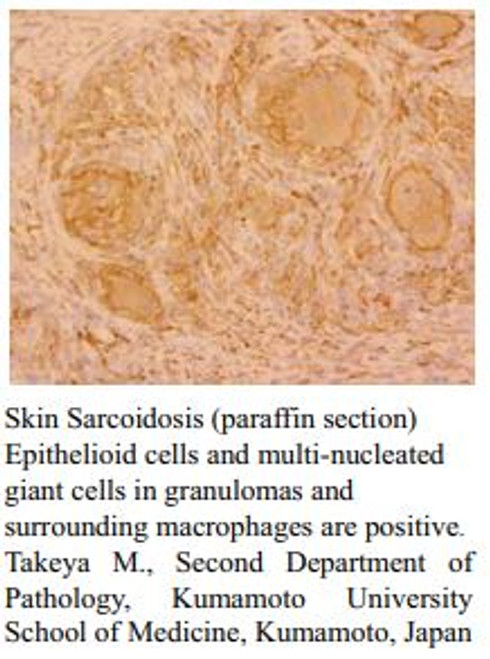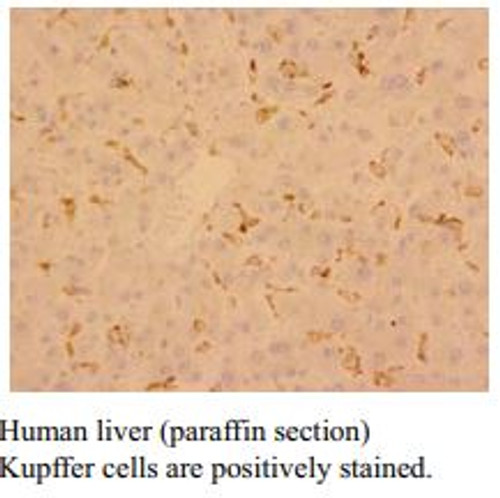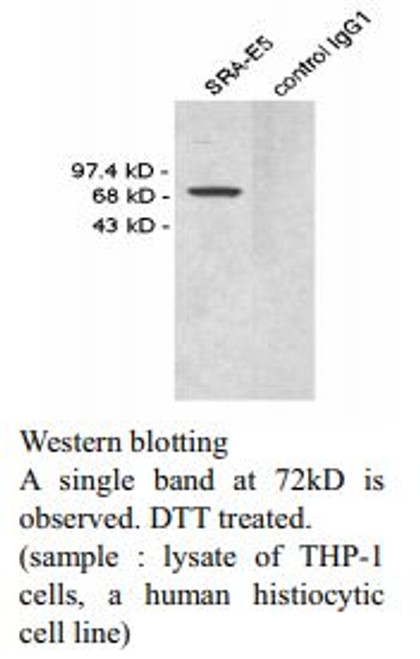| Citations for Anti MSR-A (CD204) mAb (Clone SRA-E5, IgG1) – 12 Found |
| Maile, Laura A; Busby, Walker H; Nichols, Timothy C; Bellinger, Dwight A; Merricks, Elizabeth P; Rowland, Michael; Veluvolu, Umadevi; Clemmons, David R. A monoclonal antibody against alphaVbeta3 integrin inhibits development of atherosclerotic lesions in diabetic pigs. Science Translational Medicine. 2010;2(18):18ra11. PubMed |
| Withers, Sita S; York, Daniel; Choi, Jin W; Woolard, Kevin D; Laufer-Amorim, Renee; Sparger, Ellen E; Burton, Jenna H; McSorley, Stephen J; Monjazeb, Arta M; Murphy, William J; Canter, Robert J; Rebhun, Robert B. Metastatic immune infiltrates correlate with those of the primary tumour in canine osteosarcoma. Veterinary And Comparative Oncology. 2019;17(3):242-252. PubMed |
Yamane, Taishi; Kanamori, Yohei; Sawayama, Hiroshi; Yano, Hiromu; Nita, Akihiro; Ohta, Yudai; Hinokuma, Hironori; Maeda, Ayato; Iwai, Akiko; Matsumoto, Takashi; Shimoda, Mayuko; Niimura, Mayumi; Usuki, Shingo; Yasuda-Yoshihara, Noriko; Niwa, Masato; Baba, Yoshifumi; Ishimoto, Takatsugu; Komohara, Yoshihiro; Sawa, Tomohiro; Hirayama, Tasuku; Baba, Hideo; Moroishi, Toshiro. Iron accelerates Fusobacterium nucleatum-induced CCL8 expression in macrophages and is associated with colorectal cancer progression. Jci Insight. 2022;7(21) PubMed
- Comments: see Supplementary Information
https://df6sxcketz7bb.cloudfront.net/manuscripts/156000/156802/jci.insight.156802.sd.pdf |
| Ikezumi, Yohei; Suzuki, Toshiaki; Karasawa, Tamaki; Hasegawa, Hiroya; Yamada, Takeshi; Imai, Naofumi; Narita, Ichiei; Kawachi, Hiroshi; Polkinghorne, Kevan R; Nikolic-Paterson, David J; Uchiyama, Makoto. Identification of alternatively activated macrophages in new-onset paediatric and adult immunoglobulin A nephropathy: potential role in mesangial matrix expansion. Histopathology. 2011;58(2):198-210. PubMed |
| Irie, Tomoaki; Yoshii, Daiki; Komohara, Yoshihiro; Fujiwara, Yukio; Kadohisa, Masashi; Honda, Masaki; Suzu, Shinya; Matsuura, Toshiharu; Kohashi, Kenichi; Oda, Yoshinao; Hibi, Taizo. IL-34 in hepatoblastoma cells potentially promote tumor progression via autocrine and paracrine mechanisms. Cancer Medicine. 2022;11(6):1441-1453. PubMed |
| Tada, Yoichiro; Matsumi, Yoshiaki; Hara, Kazushi; Miyauchi, Wataru; Sugesawa, Ken; Uejima, Chihiro; Tanio, Akimitsu; Kihara, Kyoichi; Yamamoto, Manabu; Takano, Shuichi; Sakamoto, Teruhisa; Nakayama, Yuji; Hasegawa, Toshimichi; Fujiwara, Yoshiyuki. Infiltration of CD204-overexpressing Macrophages Contributes to the Progression of Stage II and III Colorectal Cancer. Anticancer Research. 2021;41(10):4857-4865. PubMed |
| Maile, L A; Busby, W H; Xi, G; Gollahan, K P; Flowers, W; Gafbacik, N; Gafbacik, S; Stewart, K; Merricks, E P; Nichols, T C; Bellinger, D A; Clemmons, D R. An anti-αVβ3 antibody inhibits coronary artery atherosclerosis in diabetic pigs. Atherosclerosis. 2017;258( 28189040):40-50. PubMed |
| Renshaw, Randall W; Griffing, Jennifer; Weisman, Jaime; Crofton, Lisa M; Laverack, Melissa A; Poston, Robert P; Duhamel, Gerald E; Dubovi, Edward J. Characterization of a Vesivirus Associated with an Outbreak of Acute Hemorrhagic Gastroenteritis in Domestic Dogs. Journal Of Clinical Microbiology. 2018;56(5) PubMed |
| Maile, Laura A; Busby, Walker H; Nichols, Timothy C; Bellinger, Dwight A; Merricks, Elizabeth P; Rowland, Michael; Veluvolu, Umadevi; Clemmons, David R. A monoclonal antibody against alphaVbeta3 integrin inhibits development of atherosclerotic lesions in diabetic pigs. Science Translational Medicine. 2010;2(18):18ra11. PubMed |
| Thompson, Mark A; Henderson, Kyle K; Woodman, Christopher R; Turk, James R; Rush, James W E; Price, Elmer; Laughlin, M Harold. Exercise preserves endothelium-dependent relaxation in coronary arteries of hypercholesterolemic male pigs. Journal Of Applied Physiology (Bethesda, Md. : 1985). 2004;96(3):1114-26. PubMed |
| Yoshii, Daiki; Nakagawa, Takenobu; Komohara, Yoshihiro; Kawaguchi, Hiroaki; Yamada, Sohsuke; Tanimoto, Akihide. Phenotypic Changes in Macrophage Activation in a Model of Nonalcoholic Fatty Liver Disease using Microminipigs. Journal Of Atherosclerosis And Thrombosis. 2021;28(8):844-851. PubMed |
| Motoshima, Takanobu; Miura, Yuji; Wakigami, Nanako; Kusada, Natsuki; Takano, Toshimi; Inoshita, Naoko; Okaneya, Toshikazu; Sugiyama, Yutaka; Kamba, Tomomi; Takeya, Motohiro; Komohara, Yoshihiro. Phenotypical change of tumor-associated macrophages in metastatic lesions of clear cell renal cell carcinoma. Medical Molecular Morphology. 2018;51(1):57-63. PubMed |



